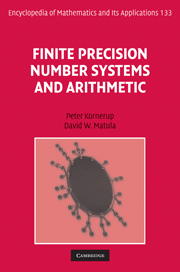Preface
Published online by Cambridge University Press: 05 March 2013
Summary
This book builds a solid foundation for finite precision number systems and arithmetic, as used in present day general purpose computers and special purpose processors for applications such as signal processing, cryptology, and graphics. It is based on the thesis that a thorough understanding of number representations is a necessary foundation for designing efficient arithmetic algorithms.
Although computational performance is enhanced by the ever increasing clock frequencies of VLSI technology, selection of the appropriate fundamental arithmetic algorithms remains a significant factor in the realization of fast arithmetic processors. This is true whether for general purpose CPUs or specialized processors for complex and time-critical calculations. With faster computers the solution of ever larger problems becomes feasible, implying need for greater precision in numerical problem solving, as well as for larger domains for the representation of numerical data. Where 32-bit floating-point representations used to be the standard precision employed for routine scientific calculations, with 64-bit double-precision only occasionally required, the standard today is 64-bit precision, supported by 128-bit accuracy in special situations. This is becoming mainstream for commodity microprocessors as the revised IEEE standard of 2008 extends the scalable hierarchy for floating-point values to include 128-bit formats. Regarding addressing large memories, the trend is that the standard width of registers and buses in modern CPUs is to be 64 bits, since 32 bits will not support the larger address spaces needed for growing memory sizes. It follows that basic address calculations may require larger precision operands.
- Type
- Chapter
- Information
- Finite Precision Number Systems and Arithmetic , pp. xi - xviPublisher: Cambridge University PressPrint publication year: 2010



